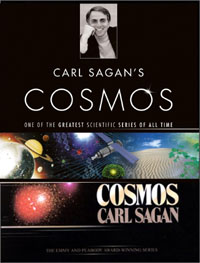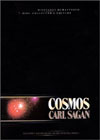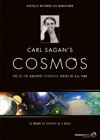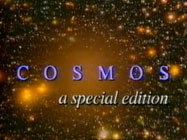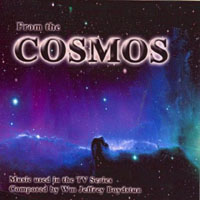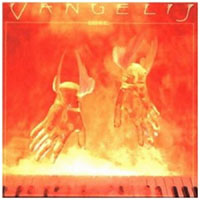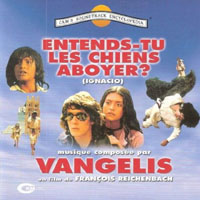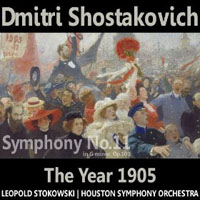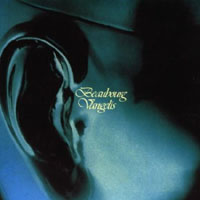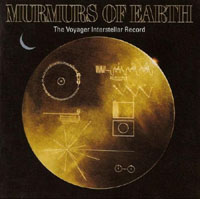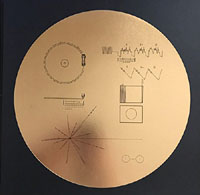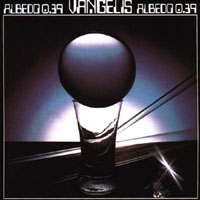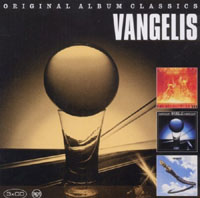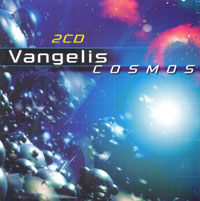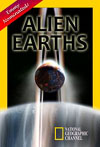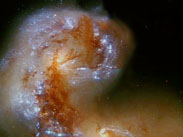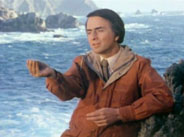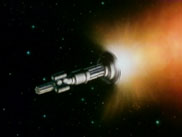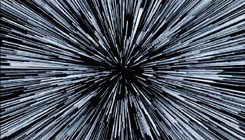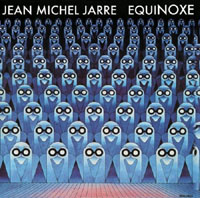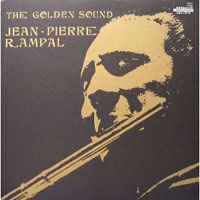"Cosmos" Episode Guide & Music Catalogue
|
| Episodes: | |||||||||
|---|---|---|---|---|---|---|---|---|---|
| 1 |
|
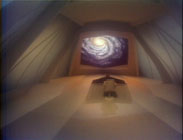
|
|
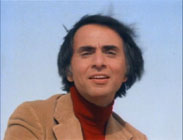
|
|||||
| 2 |
This episode concerns the composition and origination of life, examining natural and not-so-natural selection, DNA, and the chain of evolution from algae to amphibians to mammals to humans - all mapped out on the cosmic calendar. Sagan's colleague Bishun Khare recreates the Miller-Urey experiment to artificially create the molecules of life. Finally Sagan speculates on the "sinkers, floaters, & hunters" - lifeforms that might be possible in the gas clouds of Jupiter. |
|
|||||||
| 3 |
The difference between astronomy and astrology defines this episode, as does the historic struggle of Johannes Kepler to invent one out of the shreds of the other. Key points discussed include the various existing and possible interpretations for the same constellations, the Anasazi calendar as measured by sunlight in their temples, the question of whether the Sun or the Earth was at the center of celestial motions, and the struggle of Copernicus in championing the better answer. The life of Kepler dominates later screen time, culminating in his laws of planetary motion, and his novel of travel to the moon - Was it the very first sci-fi novel ever? |
|
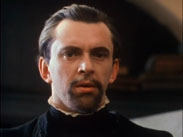
|
||||||
| 4 |
This episode touches on asteroid and comet impacts, beginning with Soviet scientist L.A. Kulik's investigation of the Tunguska event in Russia in 1908, proceeding to an impact on the moon observed by Canterbury monks in 1178 A.D., and then discussing the process of impact cratering on Callisto, Phobos, asteroids, the moon, and Earth. Erosion is demonstrated with a visit to the sphinx in Egypt. The episode also focuses on Venus, as our knowledge progressed from observation by telescope, to the concept of spectrograph light analysis, to the data briefly gathered by the ill-fated Venera landing probes. Sagan also stresses the importance of allowing, rather than suppressing, wild theories, adding that "Science is a self-correcting process". |
|
|||||||
| 5 |
It's all about Mars in this episode, as one can guess from the title. Historical speculation from H.G. Wells, Orson Wells, Percival Lowell, Robert Goddard, and even Carl Sagan himself builds enormous anticipation, until finally: the payoff. The automated Viking Lander missions to Mars are dramatized, and we see the first photos taken from the surface, and taste the ambiguity of the initial experiments. We also learn of mission contributor Wolf Vishniac, whose early forging into astrobiology and the study of extremophiles was not without sacrifice. Will we go on to colonize or even terraform Mars? |
|
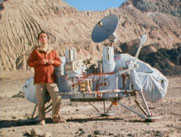
|
||||||
| 6 |
NASA's Voyager 2 spacecraft gets 20th century Humanity's first close-up look at Jupiter's moon Europa, and this episode takes us right inside the mission scientific headquarters at Jet Propulsion Laboratories in July 1979 as the pictures come in and Sagan assists the science team in analyzing and theorizing about its icy crust. History in the making! The episode also discusses Io and touches on other planets and moons of the outer solar system. Early segments also portray the age of enlightenment in 1600's Holland that saw astronomer/inventor Christiaan Huygens flourish. |
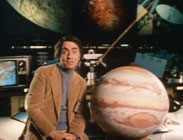
|
|
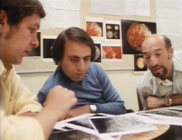
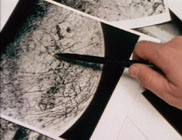
|
|||||
| 7 |
This episode takes its title from a tribal description of our Milky Way Galaxy, as we delve into the mythology of stars as cultures changed over time. Sagan takes us to the Ionian Islands to discuss many famous and not-so-famous Greek philosophers, where many familiar conflicting viewpoints crystallized. How many of these historical figures actually suppressed more truth than they publicized? Sagan's assertions are intriguing. Finally, we return to Sagan's sixth grade classroom in Brooklyn, where he teaches the young students about the coronagraph and star-wobble techniques that he hopes may one day lead to the discovery of exoplanets.... |
|
|||||||
| 8 |
This episode tackles Einstein's relativity, light speed problems, the vastness of space, time travel, and other big questions of physics. The episode also tackles the recognition that constellations change over time. |
|
|||||||
| 9 |
King Sagan has his apple pie at Cambridge University, to commemorate the fact that so many discoveries concerning the structure of atoms were made there. After covering the basics about protons, neutrons, and electrons, and introducing us to the 92 natural elements, we pay homage to their creation in the stars, and the episode devotes itself almost entirely to stellar phenomena. We learn about the many different types of stars, and how differently they each form, die, and transform. The episode also touches on gravity, black holes, and possible wormhole travel. |
|
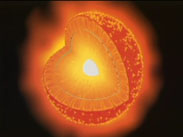
|
||||||
| 10 |
This episode goes for the BIG concepts - galaxies, quasars, the Big Bang, the structure and possible oscillation of the universe, alternate universes, and other dimensions. The classic story of Flatland is here to extrapolate the existence of a fourth spatial dimension, along with a 3D "shadow" of a 4D cube. Sagan recounts the story of Milton Humason and Edwin Hubble discovering galactic redshifts in the 1920's, as well as travel to India to note the uniqueness among religions of many Hindu beliefs that parallel modern astronomical theory. |
|
|||||||
| 11 |
This episode focuses on intelligence in its varied forms. After introducing the logical "bit" as a unit for measuring information, Sagan takes us through comparisons of the amount of information stored in DNA of species of increasing complexity, the brains of various species, and finally, books, libraries, and cities. We explore the history of whales, their culture, and what they might make of us humans whose presence has suddenly become so much more disruptive. Finally, we take a look at the information stored on the golden record on the Voyager probes leaving our solar system, and what future aliens who discover it might make of us. |
|

|
||||||
| 12 |
The focus here is on the search for intelligent life, with Sagan supporting the approach of depending on interstellar radio communication, while curtly dismissing all evidence from UFO encounters that don't fit comfortably within his scientific religion, even as the Betty and Barney Hill encounter is dramatized in some detail. The journey of Champollion in using the Rosetta stone to decipher Egyptian hieroglyphics is also re-enacted. Sagan then takes us through the infamous Drake equation for predicting the number of intelligent civilizations in the galaxy, and makes two calculations with an important difference. We also imagine the exploration of the galaxy from the point of view of two different exploring species who meet each other, and then share their common Encyclopaedia Galactica with Earthlings, which Sagan then browses on the computer in his "Ship of the Imagination". |
|
|||||||
| 13 |
This episode stresses the importance of wisdom in leadership, how very different first meetings between various cultures on our world could be glorious or disastrous depending on the approach of each leader or spokesperson. It asks the question of what first impression we will give when we encounter an off-world culture for the first time, or indeed, if we will even still be around for such a day, or if we will nuke ourselves or otherwise destroy our environment and natural habitat. |
|
|||||||
| |||||||||
Here, we examine how footage from the original 13 episodes has been divided up into these six shorter episodes, and take a detailed look at the music to try to find all 21 of Vangelis' infamous unreleased "Comet" cues... |
|
||||||||
| |||||||||
|
|||||||||||||
|
starring Neil deGrasse Tyson (host) with vintage footage of Carl Sagan also features Patrick Stewart, Alexander Siddig, Kirsten Dunst, Richard Gere, Cary Elwes, Martin Jarvis, Seth MacFarlane, and Marlee Matlin. |
|||||||||||||
| 1 |
|
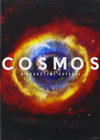
|
original air date: 2014 March 9 | ||||||||||
| 2 |
|

|
original air date: 2014 March 16 | ||||||||||
| 3 |
|

|
original air date: 2014 March 23 | ||||||||||
| 4 |
|

|
original air date: 2014 March 30 | ||||||||||
| 5 |
|

|
original air date: 2014 April 6 | ||||||||||
| 6 |
|

|
original air date: 2014 April 13 | ||||||||||
| 7 |
|

|
original air date: 2014 April 20 | ||||||||||
| 8 |
|

|
original air date: 2014 April 27 | ||||||||||
| 9 |
|

|
original air date: 2014 May 4 | ||||||||||
| 10 |
|

|
original air date: 2014 May 11 | ||||||||||
| 11 |
|

|
original air date: 2014 May 18 | ||||||||||
| 12 |
|

|
original air date: 2014 June 1 | ||||||||||
| 13 |
|

|
original air date: 2014 June 8 | ||||||||||
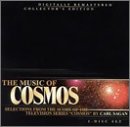
Cosmos (1980) Original music soundtrack.
|
2-Disc Edition for 2002:
the Television Series "Cosmos" by Carl Sagan Track Listing: DISC ONE: 1. Supposedly "Heaven & Hell, Part 1" (Vangelis, 4:09) 2. Symphony No. 11 in G Min. "Year 1905" (Shostakovich, 5:38) 3. Alpha (Vangelis, 5:42) 4. (Depicting) Cranes in Their Nest (Yamaguchi, 1:00) 5. Clarinet Concerto in A Major, K.622 (Mozart, 7:53) 6. Pachelbel: The Pachelbel Canon (Galway / Spreen, 5:08) 7. Metamorphosis (Boydstun, 3:34) 8. The Sea Named "Solaris" (J.S. Bach / Isao Tomita, 6:04) 9. Partita for Violin Solo No.3 in E (Bach, 2:53) 10. The Four Seasons: Spring (Vivaldi, 3:21) 11. Sonata C-Dur Trompete, Oboe, Basso Continuo (Finger, 1:21) 12. Concerto for Mandolin & Strings in C Major (Vivaldi, 2:34) 13. Tale of Tsar Saltan: Suite, Op.57 II (Rimsky-Korsakov, 6:35) 14. Legacy (Larry Fast [Synergy], 5:47) 15. Russian Easter Festival Overture (Rimsky-Korsakov, 7:44) DISC TWO: 1. Pulstar (Vangelis, 5:13) 2. "Vishnu" Symphony No.19, Op.217 (Alan Hovhaness, 4:02) 3. Melancholy Blues (Bloom, Melrose, Schoebel, 2:59) 4. Aquarius (MacDermot, Ragni, Rado, 3:56) 5. Beaubourg, Part 2 (Vangelis, 3:14) 6. The Planets - Mars (Gustav Holst, 7:09) 7. Alien Images 1 (Boydstun, 3:24) 8. Fly...Night Bird (Buchanan/Roussel/Newmark/Weeks/Silva, 7:43) 9. Entends-Tu Les Chiens Aboyer? (Vangelis, 2:50) 10. The Rite of Spring (Stravinsky, 10:31) 11. Prayer of St. Gregory (Hovhaness, 4:45) 12. Bulgarian Shepherdess Song (Traditional, 5:01) 13. Comet 16 (Vangelis, 3:48)
|
Single CD Edition for 2000:
the Television Series "Cosmos" by Carl Sagan Track Listing: 1a. Supposedly "Heaven & Hell Pt. 1" (Vangelis, 3:39) 1b. Symphony No. 11 (Shostakovich / Houston Symphony, 2:29) 1c. Alpha (Vangelis, 2:48) 2a. Depicting the Cranes in their Nest (G. Yamaguchi, 0:59) 2b. Canon in D (Pachelbel / Academy St.Martin Fields, 3:24) 2d. The Sea Named "Solaris" (J.S. Bach & / Isao Tomita, 3:38) 3. Partita No. 3 (J.S. Bach / Arthur Grumiaux, 2:53) 2c. The Four Seasons - Spring No. 1 (Vivaldi / LA Chamber, 3:22) 4b. Legacy (Larry Fast / Synergy, 2:22) 4c. Russian Easter Festival Overture (Rimsky-Korsakov, 3:03) 4a. Symph. 19 "Trekking Theme" (Hovhaness / Sevan Phil., 1:49) 5b. Beaubourg, Side 2 - Ominous [edited] (Vangelis, 1:38) 5a. Fly Night Bird (Roy Buchanan & Roussel + 3 others, 1:26) 6a. Entends-Tu Les Chiens Aboyer? - Main Theme (Vangelis, 4:07) 5c. The Rite of Spring (Stravinsky / London Symphony, 2:12) 6b. Bulgarian Shepherdess Song (Traditional, 2:19) 4d. Inside the Heart of the Universe (Toru Takemitsu, 1:30) 6c. Heaven & Hell Part 1 [Reprise] (Vangelis, 1:49)
Original CD Edition for 1994:
the Television Series "Cosmos" by Carl Sagan
Original Vinyl Edition for 1981:
the PBS Television Series "Cosmos" by Carl Sagan
|
beginning with episode 1: "The Shores of the Cosmic Ocean"
| ||||||||||||||||||||||||||||||||||||||||||||||||||||||||||||||||||||||||||||||||||||||||||||||||||||||||||||||||||||||||||||||
